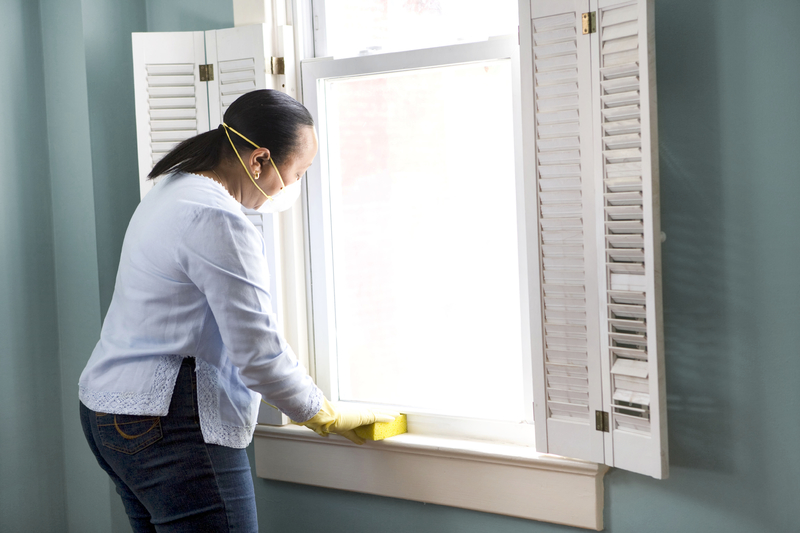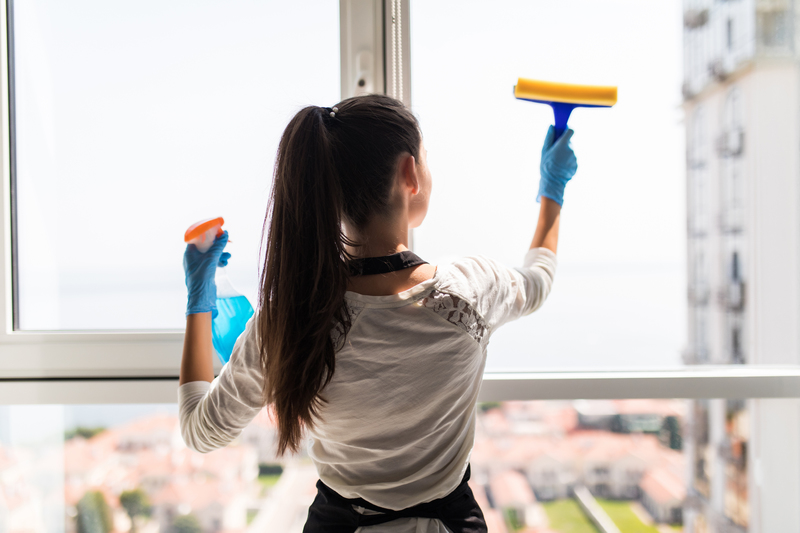Make a natural window and mirror cleaner without smelly chemicals… Stop fogging and make your bathroom mirror shine without harming the environment… Thanks to our DIY tips in this post, it’s possible to make a natural cleaning spray for windows and mirrors. Make your household chores more honest, more ecological, and more economical.
How to make a natural spray cleaner for windows and mirrors?
Material needed
To make your window spray, you don’t need professional equipment. It’s quick and easy.
– A measuring glass with a spout or a scale and a funnel
– A refillable spray bottle
– A self-adhesive label to note the nature of the product and the recipe for the next time
The ingredients and the making of the natural window cleaner

There are only 3 natural ingredients needed for this DIY:
– White vinegar, the ultimate natural multi-purpose product for green cleaning, and it cleans and descales.
– Demineralized water that acts as a natural detergent when it is emptied of its minerals.
– Essential oils of lavender or lemongrass for their sweet smell.
Organic alcohol vinegar 6% 1 l
Alcohol vinegar is ideal for making vegetable preserves, but you can also use it for home maintenance and to descale toilets or faucets.
For a 1 liter bottle, you need to mix 750 ml of demineralized water and 250 ml of white vinegar. Pour the solution obtained into the spray bottle using the spout of the measuring glass or a funnel. Then add a few drops of essential oil of your choice. Your natural window and mirror cleaner are ready to use.
Lemon Essential Oil 12 ml
For a delicious lemon scent in your home, slip a few drops of this essential oil into your room diffuser.
An additional tip for glass shower enclosures: add a little fresh lemon juice to the mixture. Rich in citric acid, lemon juice maximizes the descaling effect of the natural glass cleaner.
Then proceed in the same way as with a conventional glass cleaner. Before applying the natural cleaner, dust the surfaces to be cleaned to remove all volatile substances. Use a soft microfiber cloth for sparkling, streak-free windows.
Why use demineralized water in a natural glass and mirror cleaner?
Demineralized water is unfit for consumption because it is drained of the minerals essential to the human body. It is best known for its use in irons and steam cleaners, which it protects from malfunctions caused by limescale. But demineralized water is also an excellent natural detergent. Pure water is used by professional window cleaners, especially for cleaning at height, and it has the advantage of not leaving any traces when drying.
Instead of buying demineralized water, did you know that you can produce it at home? You may even be doing it already without knowing it. This is the case if you have a condensation dryer. The water collected in the condensation dryer tank is stripped of all its minerals through heating and evaporation.
To avoid textile residue in your natural window and mirror cleaner, run this water through a coffee filter before mixing it with vinegar.
4 natural tips for a sparkling mirror
In the bathroom, splashes of hard water quickly leave marks on mirrors or shower walls. There are many natural tips to complement the cleaning spray to remedy this.
1. Lemon juice
Cut a lemon in half and apply the juice to a soft cloth. Rub the mirror and wipe it clean—impeccable reflections, without chemical odor.
2. Whiting chalk powder
Whiting chalk powder is a soft, fine-grained white sedimentary rock consisting of nearly pure calcium carbonate, containing minute fossil fragments of marine organisms, usually without a cementing material. It is used to create a cleaning paste that has the particularity of making mirrors shine. Mix 250 grams of this powder with half a glass of liquid soap and a glass of hot water. Then apply the resulting paste to the mirror and wipe with a soft cloth.
3. Potatoes
The kitchen is full of ingredients that you can use in other rooms of the house. For example, a raw potato cut in half is an excellent natural cleaner. Rub the flesh of the potato on the mirror to get rid of toothpaste spills. Then wipe with a damp cloth and a few drops of vinegar to finish the cleaning.
4. Vegetable glycerin
It is most frequently used in natural cosmetics for its emollient and moisturizing properties. But vegetable glycerin can be used in addition to the natural mirror cleaning spray in the bathroom. After washing, it helps to limit the appearance of fog. Soak a microfiber cloth with vegetable glycerin and apply it to the mirror without rinsing.
Organic vegetable glycerin 200 ml
Glycerin is known for its moisturizing and emollient properties and is often used as a humectant in cosmetics to prevent them from drying out.
No more chemical household products to clean windows and mirrors
A few spritzes here and there to wash tiles, mirrors, smartphone or touchpad screens, car windshields… It may not seem like much, but everyday cleaning products are also a source of significant pollution in the home and the environment.
Industrial sprays that boast shiny windows without any trace are no exception to the rule. These products contain allergenic components, mainly because of the presence of preservatives from the isothiazolinone family. Window and mirror cleaners that contain ingredients such as methylisothiazolinone or methylchloroisothiazolinone should therefore be strictly avoided. Rather than spending time deciphering labels in the household products aisle, turn to the simplicity of natural homemade cleaners.
The DIY trend also solves the problem of plastic cans of conventional sprays. Disposable bottles are indeed real environmental scourges that significantly contribute to pollution. As for disposable soaked window wipes, they are not a better alternative. They produce about 20 times more waste because they are not usually recyclable, and they are just as harmful and much more expensive.
